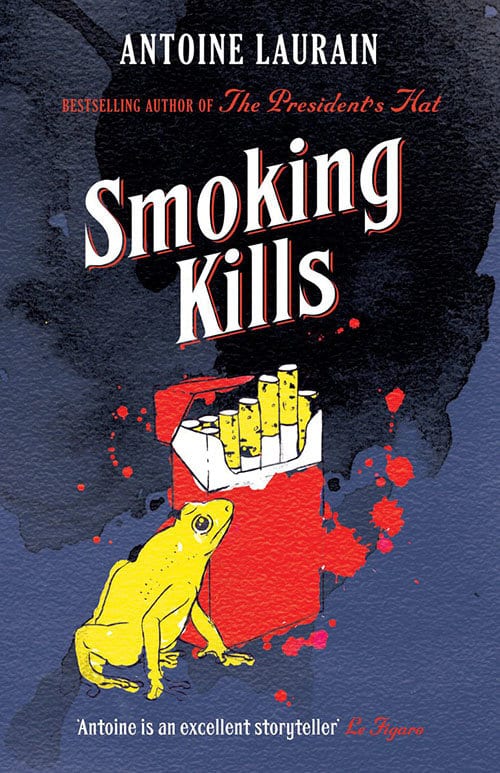
As I was reading Antoine Laurain’s Smoking Kills, I was reminded that noir is originally a French word (the term means ‘black’, of course). There’s a sense in which noir fiction bridges a gap between American and French culture. In this case, however, Smoking Kills is absolutely noir but also quintessentially French.
The story is that of Fabrice Valantine, an ex-smoker who turns into a murderer in a bizarre effort to recover his addiction. It’s a crime story, but not a whodunnit – the narrative is told from the perspective of the murderer, who starts out his tale from prison, so we know where this is going from the outset. The essence here is not the investigation, but the murky reasons behind the crimes, and these reasons are at once nostalgic and satirical, romantic and cynical.
The plot has a touch of the surreal about it. As I mentioned, Monsieur Valantine gives up (or is rather pressed into giving up) cigarettes by seeing an hypnotist, who removes the pleasure of smoking but neglects to remove the urge. This leaves the protagonist in a condition of existential ennui, which he is only able to evade by the cathartic shock of murdering someone. As well, by killing he recovers the pleasure he felt from smoking, if only for an hour or two. In sum: Valantine’s addiction to cigarettes transforms into an addiction to murder.
The serial killings are ingenious, but they’re not always at the heart of the author’s concerns, and they allow for frequent tangents. These are usually about the hows, whys and whens of Valantine’s smoking habit, but they also end up in unexpected places like sex, herpetology, and modern art. Smoking Kills won’t satisfy you if you’re looking for a fast-paced crime novel, but it works – and impressively well – in all other respects: the writing here is light, distinctive and drenched with irony. The narrator’s laconic and sometimes downright insulting comments on everything that surrounds him make for a cynical joy to read. Valantine is very far removed from what we would call a man of virtue, but his imperfections are precisely what make him feel closest to us — even when things become truly extreme.
I mentioned that as well as being very noir, the novel is also very French. The city of Paris, which provides the setting, is treated with familiarity rather than romanticism, and there are several tropes common to French literature. These range from the callous approach to the topic of murder (practically a cliché since Camus) to the natural ease with which the form of the novel cross-fertilises with that of the biography. In terms of style, a similarly detached, cynical, ironic voice is often adopted by the characters of other Francophone authors like Michel Houellebecq or Belgian Amélie Nothomb.
Compared to the latter two, though, Laurain is more affable to his readers. He’s not as self-involved as Nothomb, and certainly nowhere near as misanthropic and vulgar as Houellebecq. So one of the book’s salient merits, for someone approaching it in English, is that it provides an excellent, eminently enjoyable introduction to what contemporary novels are like in the French-speaking world.
Smoking Kills felt to me like a frolic at first – an entertaining but ultimately inconsequential story. Yet the more I think about it, the more my appreciation of this novel grows. As long as you don’t make the fatal mistake of taking the protagonist’s deeply flawed opinions at face value, this is sure to be a subtle, stimulating read. The narrator repeatedly and enthusiastically defends the joys of smoking, yes, but he does so from a prison (metaphor ahoy). At the same time, the novel draws associations between anti-smoking rhetoric and the clichés of health-and-lifestyle discourse, which are presented as their own kind of prison.
The book’s constant interplay between themes of personal and social freedom is not just delightful, it’s also distinctly adult and unassuming: for all of Valantine’s arrogant hedonism, the novel itself refuses to reduce its arguments to the dichotomy of being for or against the smoking ban, and by extension, of being a smoker or a non-smoker. For Laurain, the individual remains fully responsible for his/her decisions. When also factoring in one of the most savage, most gloriously satisfying endings I’ve read in ages, I can’t help but recommend this book for what it is: a gem.

